|
Believe it or not, I’m a teacher who doesn’t love the summer. Sure, it’s always nice to have a break from the intense days of the school year. But I have always struggled when I don’t have structure in my life. Strange as it might sound, I need someone else to tell where I need to be and when; the break in the routine of the school year that occurs during the summer has always posed a challenge for me and can wreak havoc on my emotional well-being. Here enters summer PD. 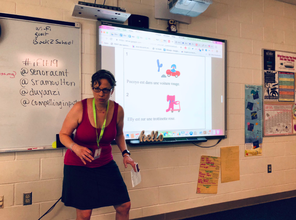 I am participating in six different conferences this summer and the third one, iFLT, just wrapped up in St. Petersburg, Florida. The past five days have been enlightening, empowering, exhausting, and engaging. I had opportunities to work with teachers in so many different capacities, and I relish them all. Not only was I able to share my favorite teaching technique, Movie Talk (or ClipChat), I discussed strategies on reading in the elementary language classroom as well as approaches to making the most of a FLES class despite the challenges many FLES teachers face. Additionally, I had the honor and privilege to coach some incredible teachers and collaborate with a sub-cohort in the beginning track. As I sit on the plane and reflect on the week, I wanted to share my two biggest take-aways. 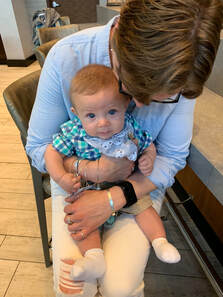 Take-away 1.5 - a little Memphis Roy love Take-away 1.5 - a little Memphis Roy love 1. While there were so many incredibly masterful teachers at Gibbs High School this week, it is important for ALL of use to remember: there’s only one of each of us. The biggest part of my personality that comes out in my teaching lines most closely with the inimitable Maestra Loca and her energy, Nonetheless, I often find myself trying to channel my inner Grant Boulanger, who possesses a flawless ability to be calm and connect with students simultaneously. I strive to be a blend of those two wiz teachers, with a solid dose of Justin Slocum Bailey’s animation and expressiveness, but I know I can’t BE any of them. (NB-These specific qualities of these teachers are not necessarily what I could consider each of their strengths. I just believe that these particular traits, combined together, create the teacher identity I think works for me and my students.) Each of us needs to take the skills and strengths that we admire in other teachers and create our own unique teacher persona. You do YOU, that’s what your students need! 2. “Repetition and novelty are not mutually exclusive.” As teachers of acquisition-driven instruction, we are aware of the importance of repetition. Simultaneously the brain craves novelty (as Carol Gaab taught me). I have developed ways in which I can “do” the “same thing” multiple times with my classes, but it’s never really the same. My students can read a text after doing a Movie Talk and follow with activities with sentence strips from the text, putting them in order or associating them with images from the video. Throw in a dictation and finish up with a Socrative assessment, and I have recycled and reused the text in multiple ways, allowing my students to process the text differently each time. (If you're not sure what Socrative is, check it out; it's a free website that has some amazing assessment tools. You can watch my tutorial video here.) Above is an outline of how I structure working with texts with my younger students. It’s pretty formulaic but I strongly believe that this scaffolded progression of activities allows for the slow and deliberate transfer of output from the teacher to the student. When my students can describe pictures without any prompting from me or read sentences in a story book they are illustrating and know what they need to draw because they have worked with the material so much in different ways, I can see that they are really learning and acquiring language.
Once my plane lands Boston in an hour, it will be less than 24 hours until I find myself at Logan once again to take off for conference #4 in Agen, France. This is yet another opportunity to see other teachers in action and pull what I love from their teaching and personalities to create me. May the rest of your summer, regardless of how much is left, bring you the restoration you deserve! Bises.
1 Comment
Eight years ago I went through a pretty significant break-up. I dumped my textbook. Sorry, Valette and Valette, it's not me, it's you. When thinking about my teaching, I have found myself in situations recently where I take a step back and say to myself, "Wait a second....am I organizing my lessons by groups of vocabulary?! NOOOO!!!" I mean, I "do" modes of transportation and body parts with kindergarten. My first graders learn rooms of the house. My fourth graders do some significant work with fruits and vegetables. But I have come to the conclusion that while I do work with themes, I do not really have units based on certain categories of vocabulary. Seem contradictory? I know, I get it. But let me explain. You may want to start thinking about this by reading my post about the unit with which I start the year with my fourth graders. We start by talking about their culinary food preferences and things go from there. We then look at photos from the book Hungry Planet, which shows what families around the world eat. Finally, we finish with a Movie Talk with the animated Disney short Feast. So now let me elaborate a little more. Sure, when I think about it, I am working with sets of words that could be considered categories. But I really believe the difference between teaching focusing on themes and teaching focusing on vocabulary is how the teacher introduces the words and how the students interact with them. Let's take my kindergarten unit that highlights transportation. The culminating activity is a Pocoyo video, "La Course" ("The Race"). It has a tortoise-and-the-hare flavor to it, and we do a lot of activities leading up to that. Here's a PDF file of the Notebook file I use when introducing the structures featured in the video. I use one of the stories in the Stories by Gus on the Go app, which is actually the tortoise and the hare. Through that story I can teach the words fast and slowly. We talk about which modes of transportation move quickly and which go more slowly. We have races with actual toy planes and trains and automobiles. We play "What's in the Bag?" with different toys, and I ask students to make predictions. I happen to have a taxi that is smiling, so let's bring in emotions. I have a Thomas the Tank Engine toy, and his friend Percy. Enter colors. Everything we do circles back around to things we've already discussed, recycling vocabulary and making our discussions totally comprehensible for my students.
NB-The video on the left is in the gym and there's a PE class going on the other side of the curtain, so it's noisy! Plus, this was the day before vacation, so...!! We talk about what animals move quickly and slowly, and how they move (jump, swim, walk, fly). We play some games on the Linguascope website that focus on different vehicles but also require students to think and process vocabulary differently. Students do some categorizing, drawing different things (animals, vehicles) that travel at various speeds.
So what's my point with all of this? That it's OK to work with different groups/categories of vocabulary and words, as long as the students are given a context in which they can use the words. We teach language, not words. We cannot teach things in isolation, especially when dealing with young children. So sure, I can tell someone that my kindergarteners learn modes of transportation, but the way they process the vocabulary goes so much deeper than simply looking at a list. Sometime soon I hope to write a similar post about my "body parts unit" with kindergarten, or my "farm animals unit" that starts my year with second grade. But I needed to get this post out I have always understood the value of self-reflection with respect to my teaching. It's one thing to think about one's work, it's another to see it. Watching videos of me teaching is one of the hardest, yet most valuable, things I can do to improve on my craft.
I also find it incredible rewarding and inspiring to see other teachers in action. That being said, I want to share the videos of my classes with those of you out there who might want to see what happens in another teacher's world! NB-I have not edited these videos, nor have I chosen my best classes to film. As you'll see, there is some really messy stuff in there! But it's all for the sake of improving. Take a look at my YouTube channel, and let me know if you have any thoughts about what you see! Bisous. 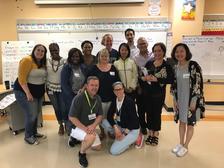 After returning from iFLT18 this year, I noticed a different post-conference feeling. When I first began my CI journey eight years ago, I remember leaving big conferences with a full and exhausted brain. There was so much information and so many amazing ideas, I felt like I was walking around in a stupor. What should my take-aways be? What's most important? Where do I begin?!?! It was critical for me to remember to start small: implement one or two specific ideas into my lessons. Every journey begins with a single step, right? At the same time, the big ideas presented at these conferences helped me to develop my philosophy and shift my approach to my teaching. I knew what I wanted to do, and why I wanted to do it. Nonetheless, I was still overwhelmed. Now I feel like I'm at a point where I walk away from days upon days of sessions and workshops energized. Seeing teachers in action allowed me to reflect on my own practice. And yes, I certainly had the doubt that Megan Hayes mentions in her post-iFLT blog post. But when I flip the post-conference-thinking coin, I find excitement the other side. Apprenticing under the amazing Paul Kirschling during adult French beginner language lab was one of the most powerful experiences of my career. I received direct feedback on my teaching from a seasoned CI French teacher. (How often does THAT happen?) My co-apprentice teacher, Blair Richards, wrote up her reflections on her blog.  I have some concrete changes I would like to make in my classroom when the students return. Last year was a particularly challenging year for me, so I'm excited to feel optimism and enthusiasm about teaching filling my soul. The pre-school adrenaline has begun to pump through my veins. (But don't worry, I have PLENTY of summer left to enjoy, including celebrating my 40th birthday.)  I hope that all of you who attended iFLT this year (thank you Teri and Carol!) can find that excitement in all of that post-conference "overwhelmedness." For those of you who were not able to attend, it's a unique and powerful conferences and I hope you will have the chance one day soon. (And New Englanders/Northeasterners who are unable travel thousands of miles, there's a wonderful opportunity right around the corner at Express Fluency's summer teacher training in Vermont. I'll be there this year, dragging Movie Talk with me! You'll also be able to see Annabelle Allen and Justin Slocum-Bailey in action (two amazing teachers whom I'm lucky to call dear friends), as well as Martina Bex, Tina Hargaden, and Mike Peto. In the meantime, may the CI force be with you. Bisous. I almost did this as a series of tweets, but thought that would just get crazy.
Consider this episode 1.5 of My CI Journey. Since my return home from ACTFL and seeing some amazing people, I have been thinking a lot about who I am as a teacher, where I am, where I want to be, and how I got here/will get there. There are a lot of people out there who have helped me become a better teacher, showing me innovating ways of approaching and thinking about SLA and teaching. So, here are those people, listed in chronological order: #IAmThankfulFor Dustin Williamson Dustin has a leading roll in episode two of My CI Journey. Without him, I may never have discovered TPRS and CI. Thank you, Dustin. Carol Gaab and Fluency Matters (formerly TPRS Publishing) Carol organized my first TPRS/CI conference; it was her second intercultural conference, in Cancún in 2011, and the following school year, I ditched my textbook and everything I knew, and embraced TPRS with fervor. Thank you, Carol. (Oh, and please bring back the Club Med conference, even if just for one year!) Laurie Clarcq Laurie is just Laurie. Anyone who knows her knows she is a loving, generous, amazing soul. I feel lucky to call her a friend. There are no words. Thank you, Laurie. Blaine Ray, Von Ray, and TPRS Books In 2012, I went to the NTPRS conference in Vegas. It was my first experience at a TPRS conference where the example language was NOT French. This was a game changer for me; S-L-O-W became my mantra, and changed how I approached delivering input to my students. Thank you, Blaine and Von. Eric Herman Eric introduced me to Movie Talk at a NHAWLT conferences a couple of years ago. I have since done countless MTs with my students, and presented on it several times at various conferences. I adore MT, and would not have known about it if I hadn't seen Eric present. MT is my favorite. Thank you, Eric. La Maestra Loca I feel so lucky to call Annabelle Allen my friend. Her energy, enthusiasm, and exuberance are contagious. She is a generous person who has inspired countless teachers, including myself. I adore Annabelle to the ends of the earth, and am always looking forward to the next time I see her. Thank you, Annabelle. Mira Canion Not only is Mira a prolific and talented writer, she's really freaking funny. And she's so much fun to hang out with. Thank you, Mira. Megan Hayes My soulmate lives in Cincinnati. Her name is Megan. I owe more thanks to Mira here, as she introduced me to Megan. Our lives and experiences overlap in so many ways, and can't wait to see her and her little munchkins at iFLT next summer. Thank you, Megan. There are definitely other people who have touched me along my CI journey, but without these people, I wouldn't be the teacher I am today. And I am grateful. Wishing everyone a happy and delicious Thanksgiving. Bisous. |
AuthorAllison Litten, the 2019 VFLA TOY, teaches French at the Marion Cross School, a public PreK-6 school in Norwich, Vermont. This is her twenty-third year teaching, and twentieth at Marion Cross. Archives
May 2023
Categories
All
|

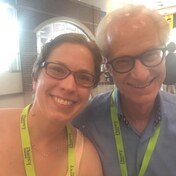
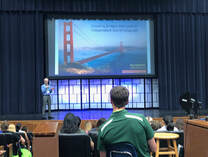
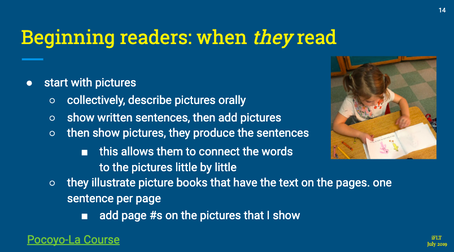
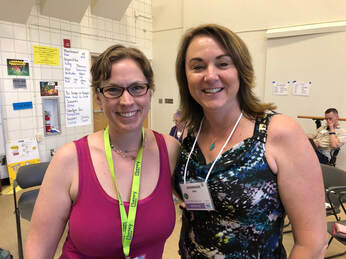
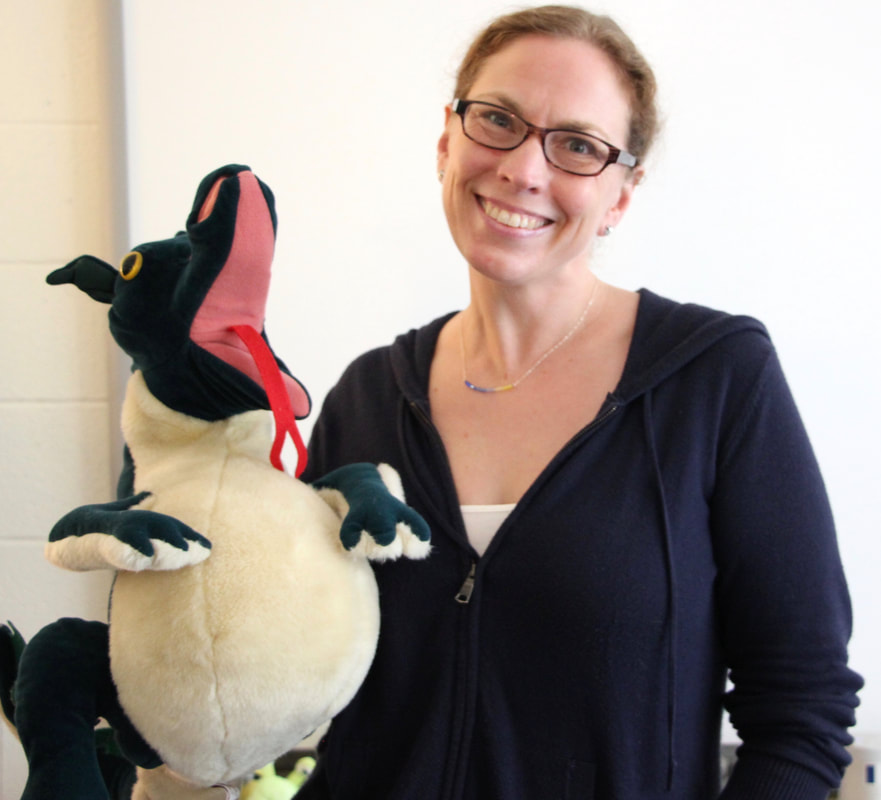
 RSS Feed
RSS Feed
